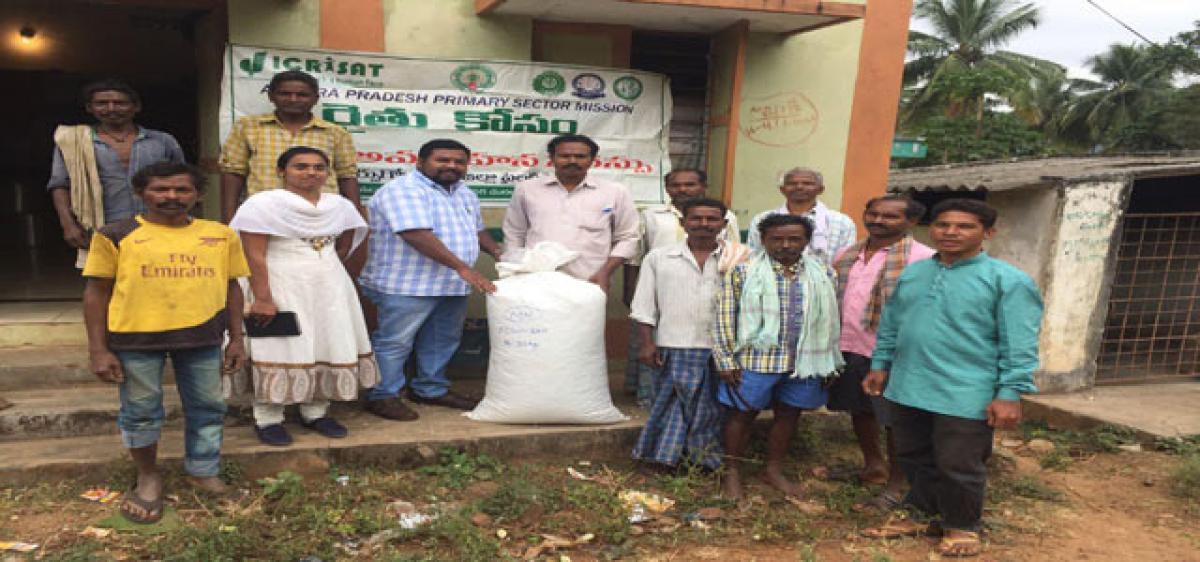Live
- Govt plans to establish offshore Johns Hopkins University Campus in India
- Goa Aces clinch Indian Racing League title
- Study finds how hormone therapy can reshape the skeleton
- High-street fashion players looking at India for manufacturing: Report
- Shreyas Iyer to lead Mumbai as Prithvi Shaw returns for Syed Mushtaq Ali Trophy
- 'Failed to resolve crisis': NPP withdraws support from BJP govt in Manipur
- Chennai: Actress Kasturi Remanded in Custody Until 29th of This Month
- Aaqib Javed likely to become Pakistan's new white-ball head coach
- BJP panel to draft poll charge sheet against AAP govt in Delhi
- Allu Arjun Thanks Fans in Patna, Teases 'Pushpa 2' Release
Just In
Seed initiative in tribal areas yielding fruitful results


The program was started in 2015 with breeder seed supplied by ICRISAT and RARS –Kadiri, with 20 farmers in an extent of 33 acres. The produce was certified by AP certification agency. The AP seed development corporation procured foundation seed by paying 20% extra than local market seed rate. In the process farmers were getting 20% extra income by taking up seed production program. For Rabi 2016-1
Rajamahendravaram: Tribals in the East Godavari agency area who normally cultivate traditional crops have now got access to high yield short duration crops like groundnut, thanks to ICRISAT which is providing technical interventions and training to farmers with the cooperation of Department of Agriculture, Andhra Pradesh. ICRISAT has planned seed production in Yarlagadda village of Y Ramavaram mandal in East Godavari district, under Rythu Kosam Project, where it has been imparting good groundnut interventions to the farmers in their fields.
The program was started in 2015 with breeder seed supplied by ICRISAT and RARS –Kadiri, with 20 farmers in an extent of 33 acres. The produce was certified by AP certification agency. The AP seed development corporation procured foundation seed by paying 20% extra than local market seed rate. In the process farmers were getting 20% extra income by taking up seed production program. For Rabi 2016-17, the same program is being carried forward with foundation seed of ICRISAT varieties such as ICGV 91114, ICGV 0350 and ICGV 0351 with double the (50) number of farmers in double the area (an extent of 75 acres) than last year. The farmers’ fields will be registered and the produce will be certified by AP Seed Certification Agency.
The groundnut foundation seed 2 produce is expected to be between 75 -100 tonnes. Last year farmers spent extra amount and time for shelling the groundnut pods to get seed, whereas this year ICRISAT has facilitated them with pod shelling machines which will be operated by a single or two persons for 3-4 hours. This will reduce cost of cultivation and labour.
Talking to The Hans India, visiting scientist, ICRISAT, Rajesh Nune stated that farmers are being trained in seed production practices with the objective of making their villages as seed hubs. In addition they are also being imparted information on seed certification, procurement agencies to be contacted and rates to be negotiated. He added that by the end of 2019, farmers groups will themselves become individual seed agencies.
Research Technician, ICRISAT, Sangeeta explained that the objectives of the project is to improve seed availability and access to improved seed varieties to farmers at reasonable price in required quantity and supply on time and build capacity of stakeholders at the community and institution level to enhance sustainable seed production systems. This would also enable institutionalizing the whole process of seed production, storage and distribution on a sustainable seed supply mechanisms.
Former ZPTC and village head of Yarlagadda village, Pallala Venkata Ramana Reddy said, “We used to go for one crop per year i.e., paddy in the khariff season. Now we are cultivating groundnut in the winter season which has about 100-day duration. We have earned profit of Rs 20,000 per acre in the last year and are expecting more this year. Surrounding villages are also inclining towards groundnut cultivation”.Caption: Visiting scientist, ICRISAT, Rajesh Nune distributing groundnut seeds to farmers in Yarlagadda village of Y Ramavaram mandal in the East Godavari district.
Samson Raj

© 2024 Hyderabad Media House Limited/The Hans India. All rights reserved. Powered by hocalwire.com






